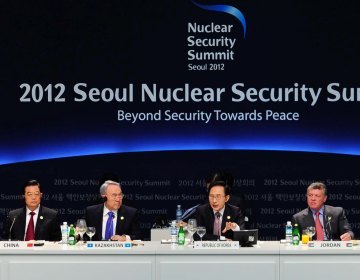Leaders of 53 countries and four international organizations attending the 2012 Seoul Nuclear Security Summit on Monday shared progress in nuclear security since the 2010 Washington summit, South Korea’s spokesperson for the Seoul summit said.
The two-day summit, the second of its kind, kicked off on Monday afternoon at COEX in southern Seoul where South Korean President Lee Myung-bak held a welcoming reception for his counterparts to greet them one by one.
 |
President Lee Myung-bak (second from right) delivers welcoming remarks during a working dinner at COEX, the venue of the Nuclear Security Summit in southern Seoul on Monday. (Chung Hee-cho/ The Korea Herald) |
They included U.S. President Barack Obama, Chinese President Hu Jintao, U.N. Secretary-General Ban Ki-moon and Russian President Dmitry Medvedev.
The leaders started their official meeting with a working dinner, assessing the two years of progress made since the Washington Nuclear Security Summit in 2010. The assessment included how the participating countries implemented their individual commitments to remove or blend down highly-enriched uranium.
“During the working dinner, leaders from 13 countries including South Korea spoke individually on how they have made efforts to enhance nuclear security and made top policy priorities to prevent nuclear terrorism in the past two years,” Han Choong-hee, sous-sherpa and the spokesperson of South Korea at the Seoul summit, told reporters.
The 13 countries in the order of leaders’ speeches were Italy, the U.S., South Africa, Pakistan, Morocco, Russia, EU, Romania, U.K., Mexico, Israel, Nigeria and Korea.
“It doesn’t mean that other countries, who did not have a speech, did not see achievements. Most of the participating countries have already submitted their national progress report,” said Han.
Only several leaders including Japanese Prime Minister Yoshihiko Noda and Spanish President Mariano Rajoy Brey did not attend the reception and the working dinner on Monday due to evening flight schedules, the organizers said.
On Tuesday, the participating countries will adopt the Seoul Communiqué, which will seek concrete action to minimize global stocks of nuclear materials, Foreign Minister Kim Sung-hwan said.
The Seoul Communiqué is expected to call for further minimizing HEU and plutonium, enhancing protection of atomic energy facilities and blocking the illicit trafficking of nuclear and radiological materials, Kim said.
“The Seoul summit will be an opportunity to reaffirm the leaders’ political will for enhanced nuclear security and to develop it into detailed action,” he said.
Along with the communiqué, participating countries are likely to announce their individual goals to reduce or scrap civilian HEU. Some others are expected to vow to convert military-purpose HEU into material for non-military purposes.
“A consensus at the Seoul summit on reducing nuclear materials will have an impact of reducing 20,000 nuclear weapons from more than 100,000 around the world,” Lee told reporters on Sunday.
At the Tuesday luncheon, leaders will discuss a new topic -- the overlap between nuclear security and atomic energy safety. Ensuring the safety of nuclear power plants has become a key issue of the Seoul summit in the wake of the Fukushima nuclear disaster, which followed an earthquake and tsunami on March 11, 2011.
According to the Global Fissile Material Report 2011 by the International Panel on Fissile Materials, global stocks of HEU for military and civilian purposes are estimated to have reached 1,600 tons. In the case of plutonium, their stocks are estimated to be 500 tons -- enough for about 100,000 nuclear weapons.
Russia is estimated to possess 616 tons of HEU available for weapons, followed by the U.S. with 260 tons, France with 26 tons and China with 16 tons, according to the report.
By Kim Yoon-mi (
yoonmi@heraldcorp.com)








